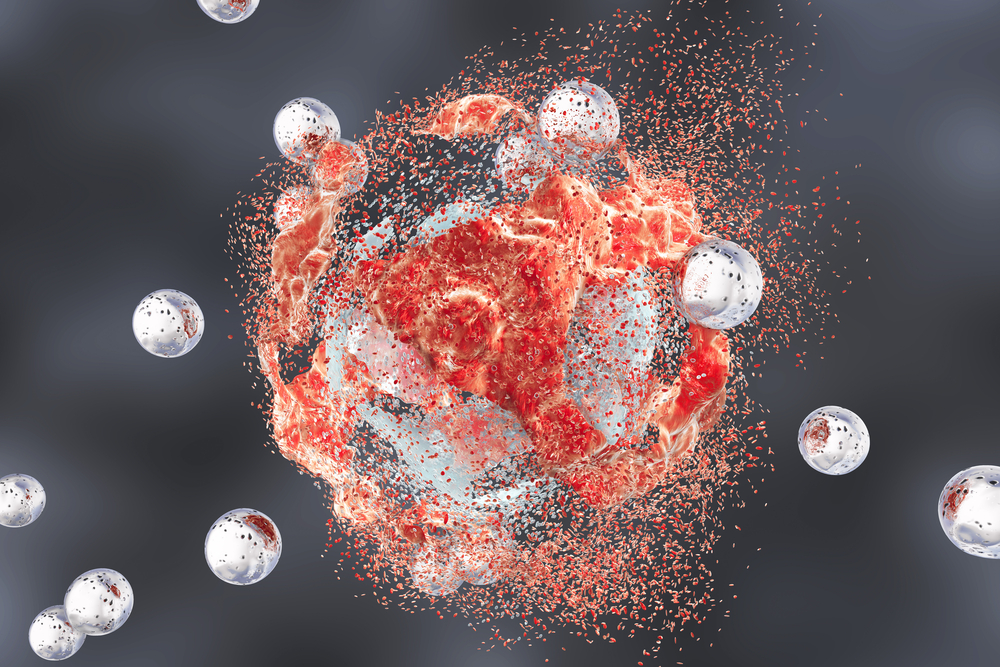
The investigational immunotherapy indoximod appeared to enhance response rates when given with FDA-approved immunotherapy pembrolizumab (Keytruda) in patients with advanced melanoma, according to interim results from a phase I/II clinical trial.
The trial, which was presented by lead study author Dr. Yousef Zakharia, M.D. at the American Association for Cancer Research (AACR) Annual Meeting on April 4, demonstrated a 59 percent overall response rate (ORR) in patients with stage III and IV melanoma.
While the combination was not compared directly with pembrolizumab monotherapy in this trial, these interim results are exciting because pembrolizumab monotherapy as an initial treatment for patients with advanced melanoma only resulted in a 33 percent ORR in the phase III KEYNOTE-006 clinical trial, which led the FDA approval of the immune checkpoint inhibitor.
“This robust data supports the need and development of a phase III trial combining an anti PD-1 with indoximod in advanced melanoma,” said Zakharia, assistant professor in the Department of Internal Medicine at the University of Iowa, Iowa City, at AACR.
Study design and results
The open-label single-arm study included patients with unresectable stage III or IV advanced melanoma that received no systemic treatment, including radiation, in the previous 28 days. Patients with ocular melanoma were not excluded.
As of March 2017, 102 patients were enrolled. Patients had the option of receiving pembrolizumab, nivolumab (Opdivo) or ipilimumab (Yervoy) in combination with indoximod; 94 patients received pembrolizumab, while the remaining eight received nivolumab or ipilimumab.
The data presented at AACR included 60 of the 94 evaluable patients, all who received pembrolizumab with indoximod.
Most patients received indoximod (1200 mg orally twice every day) with pembrolizumab, which was infused at the standard dose of 3 mg/kg every 21 days.
“To my knowledge this is the largest publically available data on melanoma patients treated with IDO and checkpoint inhibitors,” said Zakharia.
Of the evaluable patients, 40 had cutaneous melanoma, nine had ocular melanoma and 11 had non-ocular melanoma. Thirteen had previously received radiation, 15 had previously received systemic therapy and 32 had no prior therapy.
Eighty-seven percent (52 patients) had stage IV disease, while the remaining patients had stage III.
After a median follow up of 10.5 months, six of the 60 patients had a complete response and 25 had a partial response, giving an overall response rate of 52 percent. The disease control rate was 73 percent.
Of the patients with cutaneous/non ocular melanoma, the response was even better, with a 59 percent ORR and an 80 percent disease control rate. Few ocular melanoma patients responded well to the treatment.
“This is really exciting to us, said Zakharia. “This is really an impressive overall response.”
The combination was shown to be safe, with fatigue, diarrhea and nausea as common adverse events. There were only a few grade III adverse events, but they included arthritis, gastritis, and hearing impairment. There were no grade IV.
“The combination of indoximod and pembrolizumab was safe; the majority of the side effects reported by investigators are to be expected by any single-agent immunotherapy,” said Zakharia. “Other checkpoint inhibitor combinations, such as combining CTLA-4 with PD-1 have been associated with significantly more grade III and IV events.”
According to Zakharia, the main limitation of the study is that the clinical trial had no control arm, which means that a large-scale, placebo-controlled randomized clinical is needed to confirm the current results.
IDO inhibitor benefit
IDO (indoleamine 2,3-dioxygenase) is an intracellular enzyme that regulates immune response by degrading tryptophan to kynurenine.
“IDO is over-expressed in multiple types of tumors, and in the majority of cases, its higher expression is associated with worse prognosis,” said Zakharia. “The tumors highjack the IDO pathway to escape the immune system. The outcome of this pathway basically is immunosuppression.”
IDO inhibitors like indoximod act directly on immune cells to reverse the IDO pathway and mediate suppression. Pairing them with a PD-1 inhibitor, which activate the immune system to attack tumors, is a strategy that has a lot of potential, said Zakharia.
“Indoximod is an effective IDO pathway inhibitor and IDO is a key immunooncology target,” he said.
Filed Under: Drug Discovery



